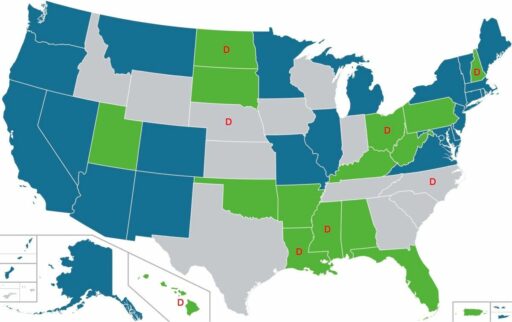The landscape of medical marijuana is rapidly evolving across the United States and the globe. With an increasing number of states legalizing medicinal use, the economic, legislative, business, and social implications are significant. This article delves into the milestones achieved in medical marijuana sales, the legislative reforms, the dynamics of the industry, and the broader social and political ramifications of this burgeoning sector.
Key Takeaways
- Massachusetts, Missouri, and New Jersey have seen remarkable sales in medical marijuana, with Massachusetts reaching $1.8 billion in sales in 2023 alone.
- Legislative actions vary widely, with Maryland exploring psychedelics, New York facing challenges in fine collection, and South Dakota tightening regulations.
- The medical marijuana industry is facing unionization challenges in Missouri, while also experiencing record-breaking sales and growth in homegrown cannabis in states like Arkansas.
- On the international front, countries such as Germany and Greece are expanding their medical marijuana markets, with global conferences highlighting the industry’s impact.
- Sales revenue is being used for social initiatives, like violence-intervention programs, and there is a growing push for policies that address social equity in the context of cannabis legalization.
The Economic Impact of Medical Marijuana

Massachusetts Hits Record Sales with $1.8 Billion in 2023
In a remarkable display of growth, the Massachusetts cannabis industry has shattered previous records, ending 2023 with a staggering $1.8 billion in sales. This surge reflects a broader trend seen across multiple states, where the end of the year often brings a spike in cannabis purchases.
The economic implications of this boom are significant, with tax revenues and job creation bolstering the state’s economy. A breakdown of the sales figures reveals the following insights:
| Month | Sales Figures (in millions) |
|---|---|
| January | $130 |
| February | $120 |
| … | … |
| December | $200 |
The consistent increase in sales throughout the year underscores the robust demand for medical marijuana and its integration into mainstream commerce.
As Massachusetts continues to capitalize on this lucrative market, it sets a precedent for other states considering the legalization and regulation of medical cannabis.
Missouri’s Booming Market: Over $1.3 Billion in Sales
Missouri’s medical marijuana market has experienced a significant surge, with state figures indicating sales surpassing $1.3 billion in 2023. This remarkable growth is a testament to the state’s thriving cannabis industry and reflects a broader national trend of increasing acceptance and utilization of medical marijuana.
The economic benefits of this burgeoning market are manifold, with tax revenue bolstering state coffers and providing funding for various public services. The following table outlines the key sales figures for Missouri’s medical marijuana market in 2023:
| Month | Sales Figures |
|---|---|
| January | $100 million |
| February | $110 million |
| … | … |
| December | $130 million |
Missouri’s success story is not isolated. States across the country are reporting record-breaking sales, with Massachusetts reaching $1.8 billion and New Jersey surpassing $2 billion since 2018. The industry’s expansion signifies a shift in public perception and a growing recognition of the medicinal benefits of cannabis.
As the market continues to mature, challenges such as unionization disputes and regulatory adjustments are emerging. Nonetheless, the economic impact of medical marijuana in Missouri is clear, with the state setting a strong example for others to follow.
New Jersey’s Milestone: $2 Billion in Sales Since 2018
New Jersey has reached a significant benchmark in the cannabis industry, with cumulative sales of medical and recreational marijuana surpassing $2 billion since the initiative began in 2018. This achievement underscores the state’s rapidly growing market, with a substantial increase in sales occurring within the last two years.
The economic benefits of this surge are evident, with the state seeing a considerable influx of revenue that can be directed towards various public services and infrastructure improvements. The success of New Jersey’s cannabis market also prompts discussions on further legislative developments, such as the potential introduction of a home grow option for medical cannabis patients.
The remarkable growth of New Jersey’s cannabis sales reflects a broader trend of acceptance and integration of marijuana into the mainstream economy. As the state continues to adapt and refine its cannabis policies, it sets a precedent for others to follow.
The table below provides a snapshot of New Jersey’s cannabis sales milestones:
| Year | Sales Milestone |
|---|---|
| 2018 | Market Launch |
| 2020 | $1 Billion |
| 2023 | $2 Billion |
Legislative Advances and Setbacks

Maryland Explores Psychedelics and Drug Decriminalization
In a significant shift towards drug policy reform, Maryland legislative committees are actively considering bills that would establish a task force to explore the decriminalization of certain drugs and the therapeutic use of psychedelics. The focus is on the potential benefits of psychedelics for mental health treatment and the broader implications of decriminalization.
- The task force would examine the use of psychedelics in treating conditions such as PTSD, depression, and anxiety.
- It would also assess the impact of decriminalizing drugs on public health, criminal justice, and societal outcomes.
This initiative reflects a growing recognition of the need to reevaluate drug policies and consider alternative approaches that prioritize health and safety over punitive measures.
New York Struggles to Collect Fines from Illicit Stores
In a striking display of enforcement inefficiency, New York’s cannabis regulators have collected a mere fraction of the fines levied against unlicensed marijuana stores. Despite the issuance of over $25 million in fines, only $22,500 has been successfully collected. This shortfall highlights the challenges faced by the state in regulating the burgeoning cannabis market.
The Office of Cannabis Management (OCM) has emphasized its focus on shutting down illegal operations and confiscating unauthorized products. However, the follow-through on raids and enforcement hearings has been hampered by resource constraints. The state has expressed a commitment to due process and the collection of fines post-legal proceedings, but the current figures suggest a significant gap between policy and practice.
The stark contrast between the amount of fines issued and the amount collected underscores the need for a more effective enforcement strategy to ensure compliance within the legal cannabis framework.
Here’s a breakdown of the enforcement efforts:
- Total fines issued: $25M+
- Fines collected: $22.5K
- Enforcement focus: Shutting down illegal shops
- Resource constraints: Affecting follow-up on raids
- Legal process: Awaiting completion for fine collection
South Dakota Tightens Medical Marijuana Regulations
In a move to tighten control over the medical marijuana landscape, South Dakota has introduced a series of regulatory changes. These new regulations aim to establish clear ‘guardrails’ for medical marijuana use, particularly for individuals on probation and parole. The state’s legislative body has filed seven bills that collectively seek to refine the operational framework of the medical marijuana industry.
Among the notable changes, a significant one is the prohibition of lawmakers and their immediate family members from owning or receiving compensation from medical marijuana businesses until 2029. This measure is designed to prevent conflicts of interest and ensure a fair market. Additionally, the state has mandated that dispensaries must have a pharmacist present during dispensing hours, emphasizing the medical nature of these establishments.
The definition of ‘medical use’ has been further clarified, underscoring the state’s commitment to a strictly medicinal approach to cannabis.
The regulations also address the issue of vertical integration within the industry, stipulating that businesses performing certain functions will count against the total number of licenses allowed for that function. This is intended to maintain a competitive and diverse market.
Business and Industry Dynamics

Missouri Marijuana Companies Face Unionization Challenges
In Missouri, the burgeoning cannabis industry is facing a pivotal moment as companies grapple with the complexities of labor laws. A notable case has emerged where a St. Louis marijuana company argues that its employees fall under the category of agriculture workers, thereby exempting them from the protections granted by the 1935 National Labor Relations Act. This stance has sparked a debate over the rights of cannabis workers and the applicability of federal labor laws to this nascent industry.
The contention hinges on the classification of cannabis workers and whether they should be afforded the same rights to unionize as other industries. The company continues to argue that due to the federal status of cannabis, their workers are not entitled to these protections. This has significant implications for the industry, as unionization efforts could lead to changes in wages, working conditions, and benefits for employees.
The outcome of this dispute will set a precedent for the cannabis industry, potentially influencing labor practices across multiple states.
While the legal battle unfolds, the industry continues to thrive economically, with Missouri’s market reporting over $1.3 billion in sales. The resolution of this issue will not only affect the workers directly involved but could also have broader economic and social implications for the state’s cannabis sector.
Record-Breaking Sales Across Multiple States
The close of 2023 marked a significant surge in medical marijuana sales, with several states reporting unprecedented figures. Massachusetts led the charge with a staggering $1.8 billion in sales, reflecting a robust market and growing acceptance of cannabis for medicinal purposes.
Missouri also showcased a thriving industry, with sales exceeding $1.3 billion. This boom is indicative of a broader national trend, where states are not only liberalizing cannabis laws but also reaping economic benefits.
The consistent increase in sales across multiple states underscores the vital role of medical marijuana in today’s economy and its potential for future growth.
Here’s a snapshot of the sales milestones achieved by key states in 2023:
| State | Sales in 2023 |
|---|---|
| Massachusetts | $1.8 Billion |
| Missouri | $1.3 Billion |
| New Jersey | $2 Billion (since 2018) |
These figures represent more than just revenue; they signify a shift in societal attitudes and the potential for medical marijuana to contribute significantly to state economies.
The Growth of Homegrown Cannabis in Arkansas
The conversation around home cultivation of medical marijuana in Arkansas is gaining momentum. Advocates argue that homegrown cannabis is not only a patient right but also a means to stimulate economic growth. Josh Alb from Cannademix highlights the importance of home cultivation, suggesting that it could create a new economy and work in synergy with the legal supply chain.
Arkansas’s neighbors, including New York, Connecticut, and Massachusetts, already permit home cultivation, which adds pressure on the state to follow suit. The potential for Arkansas to reach a significant sales milestone in the cannabis industry is evident, with predictions of surpassing $1 billion in annual sales.
The ability for patients to grow their own cannabis at home could alleviate some of the cost and time barriers associated with becoming a registered patient. This change could also address the decline in patient registrations as the adult-use market expands.
The state’s regulatory bodies currently do not have the authority to legalize home cultivation; however, there is a strong push for the legislature to consider and investigate the benefits of such a move.
Medical Marijuana in the Global Context

Germany Predicts Expansion of Its Medical Market
With the recent legislative changes, Germany is poised for a significant expansion of its medical cannabis market. The potential for growth is estimated to be up to 10-fold over the next few years, as the country adapts to a more liberalized regulatory environment. This growth is expected to be both significant and gradual, with the market being underpenetrated to date.
The new regulatory framework is set to remove administrative burdens for prescriptions and widen insurance coverage, which could lead to a substantial increase in the number of medical cannabis patients.
Currently, approximately 300,000 medical patients, about half of whom are covered by statutory health insurance, represent a mere 0.4% of Germany’s population. This figure is anticipated to rise as the market matures and becomes more accessible to patients in need of medical cannabis treatments.
Greece Legalizes Medical Cannabis Prescriptions
In a landmark move, Greece has joined the ranks of countries that have legalized medical cannabis prescriptions. This decision opens up new avenues for patients seeking alternative treatments and marks a significant shift in the nation’s drug policy.
The legalization is expected to catalyze the growth of the medical cannabis market in Greece, providing relief to patients and creating economic opportunities.
With this change, Greece anticipates a positive impact on public health and the economy, as access to medical cannabis becomes regulated and safe.
- The Greek government’s decision reflects a broader trend in Europe towards embracing the medicinal benefits of cannabis.
- It aligns with the growing body of research supporting the therapeutic potential of cannabis for various conditions.
- This move also paves the way for potential future expansions in the legal framework surrounding cannabis use.
International Cannabis Business Conferences and Their Impact
The global cannabis industry is witnessing an increasing number of business conferences that are shaping the market dynamics. These events serve as pivotal platforms for networking, knowledge sharing, and showcasing new products and innovations.
- BofC Toronto: Leadership Summit
- BofC New York
These gatherings are not just about the exchange of business cards but are instrumental in setting industry trends and policies. They often result in strategic partnerships and policy shifts that have far-reaching implications for the medical marijuana sector.
The convergence of industry leaders at these conferences catalyzes the evolution of the global cannabis landscape.
Staying abreast of the latest developments through such events is crucial for stakeholders aiming to maintain a competitive edge in this rapidly evolving market.
Social and Political Implications

New Jersey Advocates for Home Grow Options
In New Jersey, the push for home cultivation rights is gaining momentum. Ken Wolski, a prominent figure in the medical marijuana advocacy community, emphasizes the need for personal cultivation and insurance coverage for patients. Despite legalization, New Jersey stands out as one of the few states where home grows remain illegal, a prohibition that activists are eager to overturn.
The call for home grow options is not just a matter of personal freedom; it’s a step towards comprehensive patient care and autonomy.
The state’s recent legislative session saw the introduction of numerous cannabis-related bills, reflecting a broad spectrum of issues from interstate commerce to employment protections. Among these, home cultivation has emerged as a focal point, resonating with both small-business cannabis operators and patients alike. The table below outlines the neighboring states with contrasting policies:
| State | Home Grow Status |
|---|---|
| New York | Legal |
| Connecticut | Legal |
| Massachusetts | Legal |
The disparity in home grow policies highlights a regional inconsistency that New Jersey advocates are determined to address. As the dialogue continues, the potential for legislative change grows, signaling a future where patients may have the freedom to cultivate their own medicine.
Revenue from Marijuana Sales Funding Violence-Intervention Programs
The innovative use of marijuana sales revenue is reshaping community programs, with a notable example being the funding of violence-intervention initiatives. New Jersey has taken a pioneering step by allocating a significant portion of its marijuana revenue to support hospital-based violence-intervention programs. This move underscores the potential for cannabis sales to contribute to broader social objectives beyond the immediate economic benefits.
In December, the state’s leadership announced the distribution of $5.2 million in grants to these critical programs. The grants are a direct investment in community health and safety, aiming to reduce the incidence of violence through targeted interventions at the hospital level.
The strategic redirection of funds from marijuana sales to support violence-intervention programs represents a progressive approach to public safety and health. It exemplifies how legal cannabis markets can have a far-reaching impact on societal well-being.
The table below provides a snapshot of the funds allocated for violence-intervention programs in New Jersey:
| Year | Amount Allocated |
|---|---|
| 2023 | $5.2 million |
The Intersection of Cannabis Policy and Social Equity
The evolving landscape of cannabis policy is increasingly intertwined with social equity issues. States are recognizing the importance of integrating social justice into marijuana legislation, ensuring that the benefits of legalization extend to communities historically impacted by drug laws. This integration is not without its challenges, as policymakers strive to balance regulation with reparative measures.
- Efforts to expunge criminal records for past marijuana offenses
- Priority licensing for dispensary ownership to minority entrepreneurs
- Investment in education and community development programs
The goal is to create a more equitable cannabis industry that not only rectifies past injustices but also fosters economic empowerment for marginalized groups.
As the industry grows, the focus on social equity has led to innovative programs and initiatives aimed at leveling the playing field. The success of these programs is critical for the long-term sustainability and ethical foundation of the medical marijuana sector.
Conclusion
The landscape of medical marijuana is rapidly evolving, with an increasing number of states recognizing its therapeutic potential and legalizing its use. The financial milestones achieved in states like Massachusetts, Missouri, and New Jersey, where sales have soared into the billions, underscore the significant economic impact of the medical cannabis industry. As we witness historic sales records and the expansion of markets, it’s clear that the acceptance of medical marijuana is not just a passing trend but a substantial shift in public policy and perception. With new states coming on board and existing markets maturing, the future of medical marijuana looks promising, both as a driver of economic growth and as a means to improve the quality of life for patients seeking relief.
Frequently Asked Questions
Which state achieved over $1.8 billion in medical marijuana sales in 2023?
Massachusetts set a record with total marijuana purchases reaching $1.8 billion in 2023.
How much did Missouri’s medical marijuana market generate in sales in 2023?
Missouri’s legal marijuana market sold more than $1.3 billion worth of products in 2023.
As of 2024, what is the total value of marijuana sales in New Jersey since 2018?
Since 2018, New Jersey has officially surpassed $2 billion in medical and recreational marijuana sales.
What legislative changes are being considered in Maryland regarding psychedelics?
Maryland committees are exploring bills related to psychedelics and drug decriminalization.
What is the status of medical cannabis prescriptions in Greece?
Medical cannabis prescriptions have become legal in Greece.
How are marijuana sales revenues being used for community programs?
In New Jersey, $5.2 million from marijuana sales revenues are funding hospital-based violence-intervention grants.





